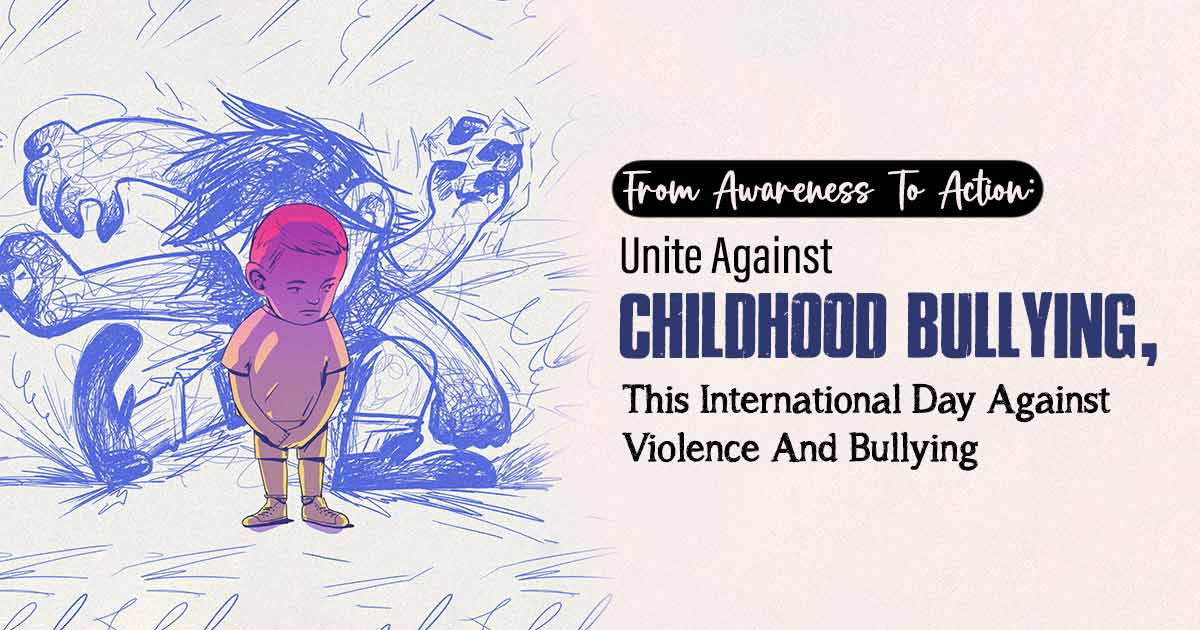Childhood is a time of innocence and discovery, a period when children should be free to explore the world, learn, and develop their identities. Unfortunately, for many children, this idyllic image is shattered by the insidious presence of childhood bullying. Today, on International Day against Violence and Bullying, we should recognize childhood bullying as a pervasive issue that has far-reaching consequences for both the victim and the perpetrator.
What Is Childhood Bullying?
Childhood bullying is a deliberate, repetitive, and aggressive behavior aimed at causing harm to a peer, often involving a power imbalance. This behavior can manifest in various forms, including physical, verbal, social, and cyberbullying. Physical bullying involves physical aggression like hitting, pushing, or stealing.
Verbal bullying encompasses name-calling, teasing, and hurtful comments. Social bullying involves exclusion, spreading rumors, and damaging one’s reputation, while cyberbullying occurs through digital platforms, such as social media, and includes harmful online interactions like cyber threats and the distribution of hurtful content.
One of the defining characteristics of early childhood bullying is the presence of a power differential, with the perpetrator possessing greater physical, emotional, or social power over the victim. This power imbalance often exacerbates the traumatic impact of bullying, making it challenging for victims to escape its clutches.
Mental Health Effects Of Childhood Bullying
The consequences of early childhood bullying are profound and enduring. Victims of bullying frequently experience a wide range of mental health effects, many of which persist into adulthood. These mental health effects of childhood bullying can manifest in various ways, including:
1. Depression:
Bullying can lead to feelings of sadness, hopelessness, and a loss of interest in activities that once brought joy. The constant torment and humiliation endured by victims often fuel a deep sense of despair.
2. Anxiety:
Anxiety disorders are common among individuals who have experienced bullying. The persistent fear of being targeted, coupled with the emotional scars of past incidents, can lead to generalized anxiety, social anxiety, or panic attacks.
3. Low self-esteem:
Bullying frequently erodes a victim’s self-esteem and self-worth. The negative self-perception cultivated during childhood can linger throughout life, affecting relationships and career prospects.
4. Post-traumatic stress disorder (PTSD):
In severe cases, childhood bullying can lead to symptoms consistent with PTSD, including flashbacks, nightmares, and emotional numbness. These experiences are akin to those of individuals who have survived traumatic events such as combat or natural disasters.
5. Suicidal ideation:
The psychological trauma endured by victims of childhood bullying can lead to thoughts of self-harm and even suicide. The pain inflicted by bullies can push vulnerable individuals to the brink of despair.
How To Heal From Childhood Bullying
While the impacts of childhood bullying trauma are undoubtedly grave, healing is possible. The road to recovery, however, can be long and challenging. Here are some essential measures on how to heal from childhood bullying:
1. Seek support:
The first and most crucial step is to reach out to a trusted friend, family member, or mental health professional. Talking about the experiences can be cathartic and provide an opportunity to process the trauma.
2. Therapy:
Counseling and therapy can be invaluable in addressing the emotional scars left by childhood bullying. Therapists can provide coping strategies, emotional support, and a safe space to work through the pain.
3. Self-care:
Engaging in self-care practices, such as exercise, mindfulness, and relaxation techniques, can help manage the symptoms of anxiety and depression that often result from bullying.
4. Build resilience:
Developing resilience can be a powerful tool against the long-term effects of bullying. This can be achieved through building self-confidence, setting boundaries, and developing healthy coping mechanisms.
5. Forgiveness:
Forgiving the bullies, although difficult, can be a transformative act. Forgiveness is not about condoning their actions but about freeing oneself from the burden of anger and resentment.
6. Advocate against bullying:
Many survivors of childhood bullying find solace in becoming advocates against bullying. By sharing their experiences and promoting anti-bullying initiatives, they can help prevent others from enduring the same pain.
Caring For Someone With Childhood Bullying Trauma
Supporting a loved one with experienced childhood bullying trauma can be challenging but essential for their healing process. Here are some ways to provide the necessary care and support:
1. Listen and validate:
Encourage open and non-judgmental communication. Let them share their experiences and emotions without interruption. Validating their feelings is crucial, as it helps them feel heard and understood.
2. Encourage professional help:
Suggest therapy or counseling and offer to help them find a suitable mental health professional. Provide emotional support during the process and accompany them to appointments if needed.
3. Be patient:
Healing from childhood bullying is a gradual process. Be patient and understanding, as they may have setbacks along the way. Offer your unwavering support without pressure or judgment.
4. Promote self-care:
Encourage self-care practices such as exercise, meditation, and spending time doing activities they enjoy. Help them establish healthy routines that promote well-being.
5. Create a safe environment:
Ensure that the home environment is safe and nurturing. Foster a sense of security, and be mindful of the triggers that might exacerbate their trauma.
6. Educate yourself:
Take the time to educate yourself about childhood bullying and its effects. Understanding the nature of the trauma can help you provide more informed and empathetic support.
Childhood bullying is a pervasive issue with severe and long-lasting consequences for its victims. However, healing is possible through seeking support, therapy, and self-care. Additionally, offering care and support to someone who has experienced childhood bullying is vital to their recovery.
By listening, validating their experiences, and encouraging professional help, we can contribute to their healing journey and help prevent the perpetuation of this silent scourge in the lives of future generations. On International Day against Violence and Bullying, we should recognize that childhood should be a time of joy and learning, and it is our responsibility to protect and nurture the innocence of every child.


























